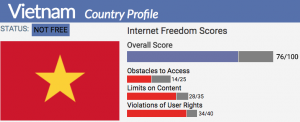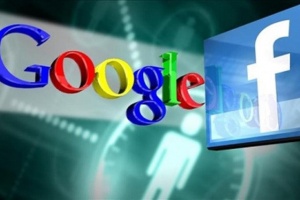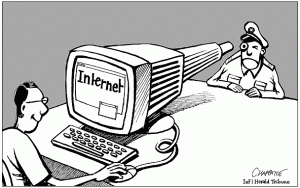Cybersecurity Law in Vietnam
The Cybersecurity Law was revolutionarily instituted by the Vietnamese National Assembly on January 1, 2019.[1] This law imposes extreme restrictions on user freedoms online in hopes of preventing cyber crimes. Under this law defaming the government, spreading false information, and promoting radical ideas online about the government must be removed immediately[2]. Moreover, social media companies and other online services have to comply with the data-localization guidelines, which require them to collect Vietnamese user data, and to report the data to authorities when requested.[1] The implementation of the Cybersecurity Law has caused significant backlash from online service providers and the Vietnamese people for infringing upon the privacy rights of Vietnam's citizens. The lack of privacy limits one's anonymity online and gives people the sense they are being surveilled.
Contents
Internet Censorship and Persecution In Vietnam
Around 50 million people, nearly 54% of Vietnam's population is online, despite the country's strict internet regulations.[3] Vietnam uses a combination of firewalls, controls, and other forms of censorship on the internet to limit anti-government propaganda and other harmful behavior.[4]
Many websites containing information about democracy and other forms of freedom are blocked. Whenever deemed necessary, authorities can control the access citizens have to the internet. Their efforts are not only limited to technical controls; Vietnam implements legislation and provides education that furthers their security intentions.[5]. The rigidness of Vietnam’s internet censorship follows similar patterns to those of its neighbor, China. Punishments for not complying to Vietnam's internet standards include internet restriction, blockage from telecommunication networks, or, worse, jail-time. Bloggers at odds with the government, those with subversive views, or reporting on incidents the government prefers to conceal are often the target of these punishments.
Nguyễn Văn Oai and Nguyễn Văn Hoá
Two Vietnamese bloggers were arrested in February 2017 for reporting on the 2016 Vietnam Marine Life Disaster, an incident of water pollution where up to 70 tons of fish carcasses washed up on the shores from the provinces of Hà Tĩnh to Thừa Thiên–Huế. Nationwide as well as international protests occurred in response to the ecological disaster, which were broken up by police. The arrests of Oai and Hoa were also consequence of the government cover up of the situation. The bloggers' arrests led to international condemnation by human rights watchdogs and journalism groups. [6]
Nguyen Van Tinh and Tran Duc Thach
These two individuals were originally arrested in 2009 and sentenced to three and a half years in prison for "propoganda against the socialist state of Vietnam" and were released in 2011. [7]
Social Media Companies
Prohibited Content
More than half of Vietnam’s population are social media users. The most popular social media sites in Vietnam are Facebook, YouTube, and Google.[8] The main attraction of social media is the absence of government regulation, making it one of the few platforms for activists to express their dissents. The new Cybersecurity law requires social media companies to remove or block any information considered toxic by the government within 24 hours, as instructed by the authorities.[2] Most prohibited content denounces the Vietnam regime or promotes radical ideas. One event that prompted this law was the discovery of a video game in Google's app store in which players could battle Vietnamese political figures. The government took offense to this and blocked the app entirely. [9] In 2017, prior to the law, Google had to remove over 6000 YouTube videos,[8] Officials from Vietnam said that Facebook has violated Vietnam’s new cybersecurity law by allowing users to post anti-government comments on the platform [10]. Furthermore, Facebook has refused to provide more information on what Vietnam considers "fraudulent accounts" to Vietnamese security agencies. As a result, the Vietnamese Ministry of Information and Communication is considering taxing Facebook for advertising revenue from the platform due to their noncompliance.
Data Localization Policies
The Cybersecurity law also requires prominent social media companies such as Facebook and Google to build offices in Vietnam to provide local data storage.[8] Currently, both companies serve Vietnam from their offices in Singapore. The data localization policy specifies that social media companies must collect personal data on users that are Vietnamese citizens. Authorities may also require companies to store information including a user's name, contact information, relationships, or online activities. The government can also force companies to store even more invasive data, such as a user's job title, medical records, and address.[1] This information must be surrendered to the government when requested. The Cybersecurity law also states that the government determines how long social media companies must store this data. Some social media companies believe the new data localization policies are a privacy violation, because they have to choose between complying to the cybersecurity law or following their own terms of service, which are generally much more open.[1]
Vietnamese Citizens
The actions of Vietnamese citizens are closely surveilled and monitored online. Any offensive commentary posted about the Vietnam regime can be subject to punishment under the Cybersecurity law. Previously, online forums and blogs were one of the only ways for Vietnamese activists to spread their beliefs to a large audience. Radical bloggers and activists were still occasionally given harsh prison sentences for posting slander online, but there were no clear legislative policies. Blogger Hoang Duc Binh had received the longest sentence to date and suffered 14 years in prison.[2]. Under the new law, any blogger caught making an offensive comment online can be convicted of a crime or restricted internet access. The punishment for the crime varies based on the severity of the statement. The government implemented a 10,000 person military unit to regulate offensive content online.[2] The government’s ability to manipulate the information posted by a Vietnamese citizen can be seen as an unauthorized invasion of personal information, and thus a breach of privacy, according to Floridi and many others.[11] The government shows no respect to this type of privacy, especially in regard to non-conforming opinions and commentary.
Ethical Implications
Surveillance
Across the world, Vietnam's cybersecurity law has been denounced repeatedly for its absence of privacy protection for the Vietnamese people. Many critics argue the law exhibits zero regard for privacy on the internet, and has destructive outcomes for freedom of expression.[12] Every act by citizens and online service providers is closely monitored and scrutinized. Constant surveillance in a public space produces ambiguity on who is monitoring actions and when.[13] Surveillance creates a significant loss of freedom because it changes a person’s experience in that space, as they self-censor. This has devastating consequences for privacy because a person’s sense of self-ownership is restricted, which affects their identity.[13] Communities online used to be the only way to escape from Vietnam’s oppressive climate, but now even this outlet is tainted. Many believe the Cybersecurity law is solely to protect the government’s monopoly, rather than for its stated purpose for cyber security.[12]
Anonymity
The government’s requirement that online service providers must collect excessive amounts of data on users greatly limits an individual’s capacity to be anonymous online. So much data is collected about a user's actions and relationships, that, if coordinated, can easily result in identifiability.[11] When examined individually, a user’s actions can be difficult to trace back to them. However, when grouped together, these actions can reveal identifying characteristics about the user.[11] Moreover, in time a pattern may form from a user’s online activity, which can particularly reveal personal details about their life. By using sophisticated data analysis tactics, the government can identity their citizens who do not conform to their preferred beliefs and standards. Anonymity provides safety, freedom, and security. Users value anonymity as a means of maintaining privacy and the Cybersecurity law restricts this ability.
Freedom of Speech and Expression
Similar to anonymity providing freedom on the internet, the cybersecurity laws in Vietnam extremely limit citizens ability to speak freely within Vietnam. While the new laws are supposed to suppress the risk of cyber threats to critical services of the Vietnamese governments and minimize cyber terrorism, the deterioration of freedom of expression is more detrimental. In reality, the government asks social media networks to erase all signs of political dissent online and restrict the ability of users to publicly announce their opinions online. [14]. In response to this, the United States social media giants such as Facebook and Google, who must open offices in Vietnam and store local user data to comply with the new laws, have not spoken out about the implication on freedom of speech. They have received criticism for not doing so as they have reason to be cautious because of public backlash and because Vietnam is currently the #7 most popular country to use Facebook. [9].
Policy Across Borders
In the past, inconsistent legislation and regulations surrounding internet conduct across different countries has led to a number of complicated ethical questions. Without a global standard to define the ethical principles of internet use across borders, it can be difficult to negotiate the laws and regulations between conflicting ideologies of two or more countries. Recently, a group of individuals formed to define a code of ethics for Google's "right to be forgotten" policy. [15] Luciano Floridi, one of the members of the board that Google constructed, wrote an article on the ethical issues that were confronted in their discussion. [15] One of the issues mentioned in his article and that the board confronted early on dealt with how policies regarding what justifies a valid delink request should translate across borders. In the future, a similar issue of how differing policies may be handled in Vietnam's relations with countries may prove to be a difficult problem to solve.
Bias in Information
The removal of content that defames the government, spreads false information, or promotes radical ideas prevents individuals from accessing any information against the Vietnamese government. This lack of information access creates a bias in information. Taking down articles that speak against the government in any capacity removes the individual’s right to have access to this information in order to come up with his or her own ideas about the government as a whole. Instead of having access to all information, an individual is biased in favor of the content that promotes neutrality or speaks in favor for the government. This kind of filtering of information by the government is manipulation and censorship. To try and intervene in the flow of information is to manipulate the people who receive such information, and it affects their perceived reality and denies them access to the facts. This careful control of access may skew an individual's opinion about the government since he or she has no way of knowing otherwise.
Data Privacy
Having Facebook and Google store and share Vietnamese citizens data with the government has a lot inherent ethical concerns with data privacy. In America, many social media companies, like Facebook, are facing outcry for minimizing the amount of data that is collected and shared on them. In Vietnam, the government is making sure that all sorts of personal data is stored and saved on every individual. Luciano Floridi states that the right to privacy is the right to be immune from unwanted and undesired changes in a person's information identity [11]. The people of Vietnam are not granted access to this right, as all of their data will be stored a retrievable. This data can be used to persecute the people of Vietnam if it breaks the governments rules on what is to be censored and what isn't. Also, this data can even expose the government to information like relationships, work place, and even medical records. This access gives the government a lot of power over their citizens. Facebook and Google don't have much choice but accept these rules if they wish to keep doing business in Vietnam, so it also raises concern about how much data they can collect on people from other countries where they don't have to save all of the data they have on users.
See Also
References
- ↑ 1.0 1.1 1.2 1.3 Olson, Jeff; O'Shea, Eddie; Nguyen, Mai Phuong (November 14, 2018). "Update: Vietnam's New Cybersecurity Law". HL Chronicle of Data Protection. Retrieved April 28, 2019.
- ↑ 2.0 2.1 2.2 2.3 2.4 "Vietnam" Freedom House. 11 Feb. 2019. Retrieved April 28, 2019.
- ↑ Luong, Dien (February 19, 2019). "Vietnam's Internet Is in Trouble". The Washington Post. Retrieved April 28, 2019.
- ↑ Warf, B. GeoJournal (2011) 76: 1. https://doi.org/10.1007/s10708-010-9393-3
- ↑ Subramanian, Ramesh, The Growth of Global Internet Censorship and Circumvention: A Survey (October 31, 2011). Communications of the International Information Management Association (CIIMA), Volume 11, Issue 2, 2011.
- ↑ Paddock, Richard C. (27 November 2017). "Vietnamese Blogger Gets 7 Years in Jail for Reporting on Toxic Spill". The New York Times. Retrieved 28 November 2017.
- ↑ "Document". www.amnesty.org. Retrieved 2017-04-26.
- ↑ 8.0 8.1 8.2 Nguyen, Mai (May 18, 2018). “Vietnam Set to Tighten Clamps on Facebook and Google, Threatening Dissidents”. Reuters. Retrieved April 28, 2019.
- ↑ 9.0 9.1 McLaughlin, Timothy (March 16, 2019). "Under Vietnam's New Cybersecurity Law, U.S. Tech Giants Face Stricter Censorship". The Washington Post. Retrieved April 28, 2019.
- ↑ “Vietnam Says Facebook Violated Controversial Cybersecurity Law”. CNBC. January 9, 2019. Retrieved April 28, 2019.
- ↑ 11.0 11.1 11.2 11.3 Floridi, Luciano (2016). “Privacy - Informational Friction”. The 4th Revolution: How the Infosphere Is Reshaping Human Reality. Oxford University Press.
- ↑ 12.0 12.1 Nguyen, Thoi (January 4, 2019). “Vietnam's Controversial Cybersecurity Law Spells Tough Times for Activists”. The Diplomat. Retrieved April 28, 2019.
- ↑ 13.0 13.1 Patton, J.W. (2000) "Protecting Privacy in Public?". Ethics and Information Technology. 2: 181. Retrieved April 28, 2019.
- ↑ "To The Dismay Of Free Speech Advocates, Vietnam Rolls Out Controversial Cyber Law". NPR. January 1 2019. Retrieved April 28, 21
- ↑ 15.0 15.1 “Should You Have The Right To Be Forgotten On Google? Nationally, Yes. Globally, No.” 2015


